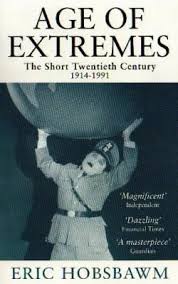 Review of Eric J Hobsbawm The Age of Extremes. The Short 20th Century 1914-1991 (First published 1994)
Review of Eric J Hobsbawm The Age of Extremes. The Short 20th Century 1914-1991 (First published 1994)
Quality of Content
 | 'Chutzpah' and Truth Denial
| 'Chutzpah' and Truth Denial 
Review by Rerevisionist 16 Nov 2015
 Published by Michael Joseph in 1991. Note that the 'fall' of the Jewish USSR is officially dated December 1991. Hobsbawm's paean to so-called 'jews' in the 20th century must have been pre-arranged. I don't know how many people are gullible enough to imagine the USSR's planned failure (with 'Jewish' 'oligarchs' getting away with fortunes) was unexpected; of course it wasn't. The mentally and physically hideous Hobsbawm must have been tipped off, and compiled this rubbish as part of the propaganda deluge fuelled by the 'Fed' and by 'Jewish' propaganda. Hobsbawm has an 'End of Socialism' chapter, which includes China in addition to the 'USSR'.
Published by Michael Joseph in 1991. Note that the 'fall' of the Jewish USSR is officially dated December 1991. Hobsbawm's paean to so-called 'jews' in the 20th century must have been pre-arranged. I don't know how many people are gullible enough to imagine the USSR's planned failure (with 'Jewish' 'oligarchs' getting away with fortunes) was unexpected; of course it wasn't. The mentally and physically hideous Hobsbawm must have been tipped off, and compiled this rubbish as part of the propaganda deluge fuelled by the 'Fed' and by 'Jewish' propaganda. Hobsbawm has an 'End of Socialism' chapter, which includes China in addition to the 'USSR'.(Added later: looking back, I put the wrong publication date. 1991 is too early—even the hacks would have noticed).
My edition is a hefty paperback; printed I think on thick paper to give the impression of substance. It has a bibliography of approaching 500 books; with further reading, 'for those who want to know more', of about 80 titles including for example Gabriel Kolko.
Hobsbawm is a perfect example of an academic promoted because he's 'Jewish'. He had a sort of flavour of Marx, camouflaging his 'Jewish' tribal race bias. 1991 must have been fed to him; 1914 of course marks the start of 'Jewish' wars aiming for the end of white rule.
Edward Said, in the London Review of Books: It is difficult to imagine that anyone other than Hobsbawm could have approached – much less achieved – the consistently high level of these volumes: taken together, they represent one of the summits of historical writing in the postwar period. (Said was a fairly typical third-world academic poseur).
On 'Jews', Hobsbawm writes of 'handful of dead of 1881' and '40 to 50 of Kishinev pogrom of 1903', given in a puzzled way as contrasted with later numbers of deaths of whites in Russia, for example. Slight contrast, is there not? Pogrom revisionism is a new field; see this link, for example.The First World War 'broke out'. Possibilities of British neutrality or US non-intervention aren't considered, of course. Hobsbawm thinks the US Civil War had 'more casualties than all US 20th century wars' which I suppose is a grateful hat-tip to simple American allies. Others don't fare so luckily: there's nothing for example on the Bengal famine, the Boxer rebellion, Nigeria and Biafra. The inferior races are written out.
On the 'Great Depression', Hobsbawm treats this in the standard childish way, quoting 'Jewish' news sources. (Finance, and money, are unindexed). This leads up to the journalistic-style nothingness of: the dollar, 'keystone of the post-war world economy planned and guaranteed by the USA, grew weaker'. The 'rate of GNP growth in 1980s' given naively as a measure—as it is for 'Jews'..
On the 1920s and 1930s, Hobsbawm has heard of 'the march on Rome', and Fascism, though with no grasp of the arrangement of support. He quotes from the alleged historian Ian Kershaw, that Nazism is 'scarcely capable of rational analysis'—not true, of course, but for the 74-year old Hobsbawm a bit of an effort.
The USSR gets mentions: Lysenko is given some prominence. 'Killing, torture, mass exile... everyday experiences which we no longer notice' is a verdict.
Hobsbawm is of course grateful for the Jewish mongrel and war criminal: the 'universally loved and admired war leader, Winston Churchill'. He quotes the supposed six million total of 'Jews' in the 'Holocaust' fraud, but, maybe as a token to revisionism, says this is 'probably exaggerated'. The post-1945 'fall of Empires' is noted, but the US empire is unmentioned.
Then we have the chapter entitled 'The Golden Years'—from the 1950s—luckily coinciding with Hobsbawm's pseudo-career.
Connoisseurs of scientific revisionism will be amused that the chapter on Science was contributed by John Maddox, an undistinguished editor, includes AIDS, molecular biology, Nobel 'laureates', number of scientific papers as a measure, the ozone layer, wave/ particle dualism, all treated conventionally. We also have chaos theory, presented as though a complete body of knowledge. There's an electron micrograph of a bacterium 'spilling its DNA'. And a section on 'transport beyond the earth. The first moon landing', absurdly suggesting a routine. Naive stuff on opposition to fluoridation.
Hobsbawm makes no distinction between science and technology; he talks of 'millions of scientists' and incidentally has little on what they do; especially arms and nuclear issues.
The arms industry is at least noticed though; there was 'little else' which a declining industrial state like the UK could sell competitively. Though the GNP is highest ever. A few more scribbles: Rockefeller, raw materials, oil are not in the index. Nor is the Jewish 'news' source Reuters. Isaiah Berlin is quoted: "I remember it only as the most terrible century in western history". TV gets a couple of small sections; Fleming on the 'Cold War' is unindexed; US labor relations are not indexed. There's quite a bit on 'modernising', for example in Japan, with nothing specific. We are told poison gas is 'barbaric', and based on German science and chemistry—guess what lies are beneath this.